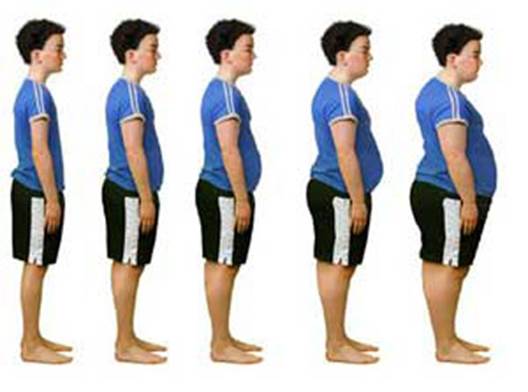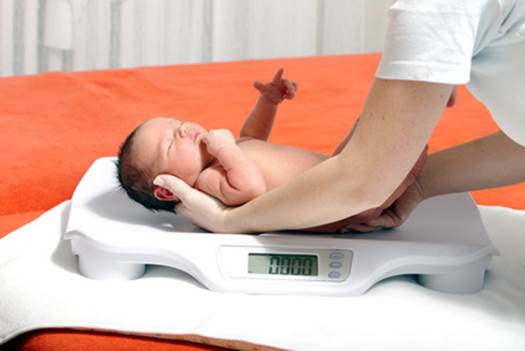Weight at birth is important. But the rate
of weight increase at each stage of growth is more concerned.
The baby's weight is influenced by genetic,
health and nutrition of mother during pregnancy.
But you have to remember that baby's weight
at birth is not the most important thing, the rate of increase weight at each
stage of growth is more concerned.
Lose weight after birth
After birth, all babies have a same point,
it is losing physiological weight. The main reason is the reduction of water in
baby body (which is in its body when it is still in mother’s womb) through
urine and stool.
In addition, your baby must have time to be
familiar with new way of nutrient absorption, from outside, not through the
placenta like before. And if you breast feed, your body also needs time to
produce milk.
Many babies lose 10% weight in the first
few days after birth and gain weight back after 10 days of age.

Weight
at birth is important. But the rate of weight increase at each stage of growth
is more concerned.
Weight landmark in full term baby’s development
Normally weight of newborn baby is between
3,000 – 3,500g. Baby’s weight is less than 2,500g, if it is born at full term,
it means it is malnourished fetus, if not, it is born prematurely.
At the first week, it can lose
physiological weight from 5-10%, from the 2nd week it starts to gain weight
rapidly.
Average of the first 3 months, it gains
weight 1000-1200g/month, from 3-6 months, it is about 600g/month, and from 6-12
months is 300-400g/month. From 1-10 years old, it gains an average of
2-2.5kg/year.
You may remember the following landmarks:
§ 10-14
days old: recovery birth weight
§ 5-6
months old: double birth weight
§ 1
year old: triple birth weight
The best way to see if your baby develops
normally or not, or whether you fed it enough, is to regularly monitor its
weight, especially in the first months.
How about time to weigh?
Weigh at least 1 time/week in 6-8 first
weeks, and then you can decrease to 1-2 time/month until it is 4 months old.
From 5 months old to 2 years old, weigh it 1 time/month.
At preschool age, children should be
monitored weight monthly to know if they develop well or not. You should weigh
your baby on a fixed day in month (like the day it was born) and draw a health
line to monitoring easily.
To know if its weight reaches the standard
or not, you can calculate standard weight by age as following formula:
X = 9.5 kg + 2 (N-1)
§ 9.5
kg is average weight at 1 year old.
§ 2 is
average increasing weight in 1 year.
§ N is
the number of age.
For example: If your child is 3 years old,
do as following: X = 9.5 kg + 2 (3-1) = 13.5 kg. So, 3 years old kid's weight
is 13.5 kg.
Problems of baby’s weight should be noted
Is it ok if the baby does not gain weight
for 3 consecutive months, but is its weight still in normal limits?
Though your baby is not malnourished, it
doesn’t gain weight in 3 consecutive months, it means its development is
stopped. It is a warning sign of health and not feeding well. Effect level to
health is more or less depending feeding and health of children.

Problems
of baby’s weight should be noted
Reasons making your child not gain weight may be
Eating not enough food, lack of nutrition,
breast milk, fewer meals, and the food for children is short of nutrition, less
animal foods, beans, oil leading to not enough energy for children to develop
and operate.
Eating well, but playing too much consumes
much energy. You need to feed your children more.
Children suffer from some disease but have
not detected.
If kids gain weight monthly but their weight is still
below normal landmark, is there anything to worry?
Kids gain weight monthly means they have
normal development, so there is nothing to be afraid. Therefore, you can
maintain current diet but you have to ensure enough meals, quantity and quality
of each meal, and better care for them, be close to help them gain weight,
quickly reach the normal weight.
Babies are easy to overweight
There are many factors leading to
overweight, the most common is that intake energy is over demand, especially
energy from fat and powdered sugar. In addition, decreased physical activity is
also high risk factors of overweight.
If babies do not participate in physical
education, sports, less walking, riding bicycle ... but spend much time on
watching television, playing computer games…, it also makes them overweight. It
is important to monitor the growth of children at all ages through the index
weight, height. It helps parents to detect malnutrition or overweight easily to
treat in time.

There
are many factors leading to overweight, the most common is that intake energy
is over demand, especially energy from fat and powdered sugar.
Babies eat a lot but still are
malnourished
Gaining weight steadily is the most
important sign to show that a baby is growing and developing well. Every kid
should have a growth chart. You need to mark after each weighing and monitor
its changes every month.
If your child does not gain weight or not
growing well, you need to take it to the doctor to check, find out the cause to
repair timely, because nutrients also play a key role in its habitus.
Otherwise, if malnutrition continues
happening, it will lead to a series of bad consequence about spirit,
intelligence and constitution.
Baby's weight gains and loses abnormally
Sometimes after weighing and measuring with
the age, the baby is found to be "above average" much, but parent
still wonders why this month it does not gain weight or it is anorexia? In
fact, from 12 months old, baby will gain weight slowly, only 200g/month.
In general, if your baby does not gain
weight (or slowly), it may because it does not eat enough nutrients, so its
body cannot absorb and use nutrients properly. Moreover, there are many reasons
making it slowly gained weight such as diet, health history, physical activity
or mental disorders.
You need to understand the causes of the
slowdown on your baby's weight to have the most appropriate method.
Secret to ensure ideal weight for your
baby
Balance nutrients with a various menu for
your baby.
From 6 months old, your baby starts eating,
so you must let it be acquainted with solid foods, with adult’s food. At
kindergarten age, it needs a diverse diet, providing enough nutrients to meet
the demand of its body.
A various diet is a diet in which each meal
is full of important food group such as daily meals and snacks will ensure the
basic nutritional needs of the body in each stage without adding any special
diet.
So if your baby eats 3 meals and 3-4 snacks
a day, with foods such as fresh fruit, vegetables, grain, starchy foods like
bread, rice, noodles; meat, fish, egg, beans; milk, yogurt, cheese and other
products, you don’t have to worry anything, even if it misses a meal or even
all day, the nutrients in all week or month will meet the needs of its body.
Encourage your child to exercise
You also need to create conditions for your
baby to play, exercise outdoor at least 30 minutes a day. He will be hungry at
mealtime, sleepy at bedtime automatically. Eating and sleeping well will help
it gain weight steadily.

Encourage
your child to exercise
Care for baby’s sleep
Get your baby into the habit of going to
bed early, sleep enough, take an afternoon nap because sleep will help it rest
to regain strength after game, playing all day. Sleep will make sure it is
healthy and improves weight.
How to detect malnutrition?
The simplest method is to regularly weigh
your baby monthly to monitor. If it gains weight steadily, it is an important
sign of a healthy baby with normal development.
Not gaining weight is a warning sign of
health and not good feeding, you need to take it to the doctor.